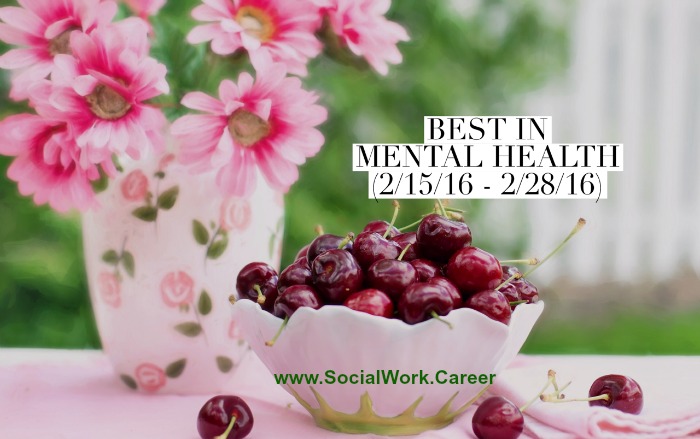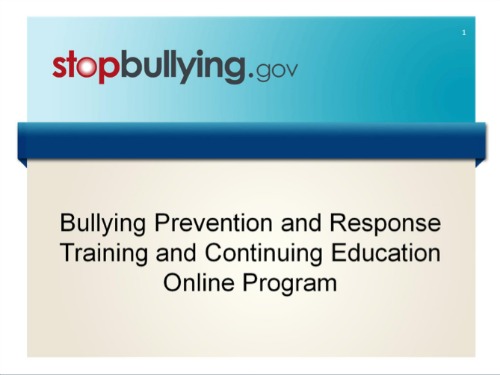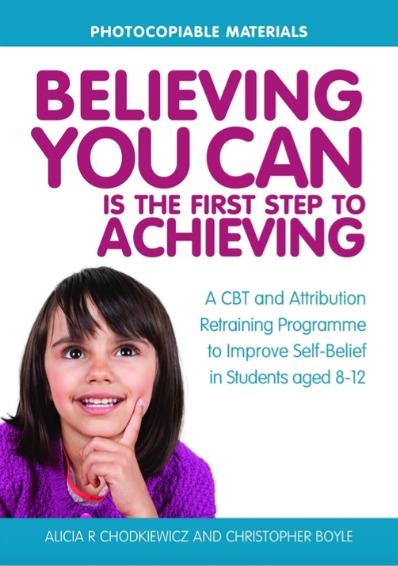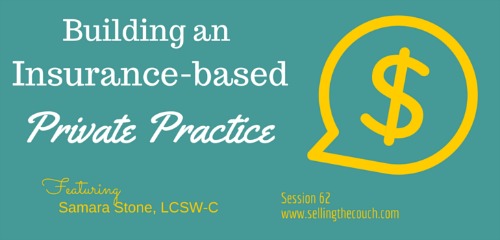 Mental Health Roundup
Mental Health Roundup
This contains some of the latest news in social work, healthcare, private practice and more!
This week’s wrap-up has 5 main themes:
- Healthcare
- Advocacy/Cultural Sensitivity
- Education/Technology
- Therapy
- Career/Private Practice/NonProfit
Healthcare
- Applying an ‘equity lens’ to Cochrane Reviews – Jennifer Petkovic and Vivian Welch describe the PRISMA EQUITY extension, a 27-item reporting guideline, which applies an ‘equity lens’ to increase health equity in reviews.
- The CDC’s New Guidance on Women and Alcohol – Jess Williams talks about the effect of alcohol affect on fetal brain development, the rationale for CDC’s recent recommendation, and the news feed eruption that followed.
- Commonly prescribed psychiatric drugs: do they work? – John Baker summarizes a review of commonly prescribed psychiatric drugs and found that some of the Rxs have relatively low effect sizes with only 11 out of 17 of them showing a minimal clinically important difference.
- Highway to addiction: how drugs and alcohol can hijack your brain – “a brain circuit ‘shortcut’ could explain why some addicts unintentionally relapse, and suggests that a shift in focus for therapies might help those who want to stay off drugs.”
- New online tool launched to help people struggling with bipolar disorder – the Behavioral Health Quality of Life Tool (BHQL) is a free online survey that identifies a user’s unhealthy habits and provides customized recommendations for a healthier lifestyle.
Advocacy/Cultural Sensitivity
- Closing the Wealth Gap for Families of Color – La June Montgomery Tabron calls for policies/programs to encourage short and long-term savings, promote debt reduction, increase access to credit, support higher incomes for low- and middle-income workers and increase housing mobility.
- A college degree is worth less if you are raised poor – as per Brad Hershbein, individuals with BAs from low-income backgrounds not only start their careers earning less than those from higher-income backgrounds, but this gap widens over time.
- Fordham MSW and MS Students Speak at the United Nations – they reported on their work with the NGO Committee on Migration, whose mission is to encourage the protection of migrants and their human rights.
- Global Social Challenges– Innovate@BCSocialWork talks about the various factors impacting educational outcomes of orphan and abandoned children in India and shares key findings such as: the greater likelihood for girls vs. boys to involved in HH chores and non-domestic work.
- Hollywood’s Lack of Inclusion, Homophobia, Open Carry Law, The Objectification of People With Disabilities – Relando Thompkins-Jones shares key snippets from 6 articles that he read this week.
- How Do We Protect the Elderly from Fraud – Wendy Williams provides some helpful resources including a helpful toolkit from Home Instead Senior Care Network.
- How I Came to Embrace My Mental Illness – Rachel McKibbens shares a personal essay on her experience with bipolar disorder; denial of her problem worsened her condition but acceptance of her illness via poetry led her journey to recovery.
- Let’s Stop Bullying: 10 Things You Need to Know – David Susman summarizes 10 key learnings from the stopbullying.gov online training including types of bullying, protective factors, best practices and effective responses.
- The Long Drive to Flint – CSSW – “Alumnus Adeoti Oguntoye (MSW’01) tells the story of his drive from Atlanta to Flint, a distance of 764 miles, to deliver bottles of clean water and to bring a statement of solidarity and hope to the people in that city.”
- New Strategies Long Overdue on Measuring Child Welfare Risk – SJS/Chronicle Of Social Change… talks about Rapid Safety Feedback (RSF), a [successful] new tool that has been used by Eckerd to target high-risk cases for special treatment and review.
- Popular Culture, Race, and Representation – W. W. Norton calls for a cultural shift whereby all members of our society are represented and honored.
- Program helps foster youth continue education – based upon Paul R. Pace talk with Maria Garin Jones from Foster Care to Success (FC2S), he describes some of the resources available to help foster youth pay for college/other training programs.
- What is #JusticeForLB and Why It Matters… – calling for behavioral health integration, Sean Erreger shares a touching account of Connor Sporrowhawk (a.k.a Laughing Boy, LB) who drowned in a bath tub in a residential setting for individuals with a learning disability as a result of a known seizure.
Education/Technology
- Apps in Social Work Practice – Ellen Belluomini describes important considerations for app use: HIPAA/PHI compliance, assessment of client need and own knowledge of app, and evaluation.
- An introduction to CoT and Part 2 – Jennifer Hollander applies Culture of Thinking (CoT) as a school social worker; this includes Modeling, Opportunities, Routine, Expectations, Language, Interactions, Time & Environment.
- Cultivating Digital Wellness Skills in College Students -Josie Ahlquist shares thoughtful questions and resources to help in evaluation and reflection of both emotional cues and usage patterns vis a vis different platforms.
- Most Mental Health Apps Are Based On Flimsy Science, Says Task Force Chair – John Torous states that most of the research he sees for the apps is biased because it is funded by the app makers and recommends the apps made by the U.S. Department of Veterans Affairs.
- Navigating Success in the “Signature Pedagogy” – to support non-traditional MSW students, the Field Educator recommends practicing self-awareness to avoid instructor bias, making course expectations as clear as possible, encouraging positive faculty-student interactions and more.
- Parental Monitoring Apps and Cyberbullying – software does not prevent online harassment; however, the Cyberbullying Research Center suggests interested parents talk with their kids about Internet safety and use the least intrusive monitoring app they recommend.
Therapy
- 7 Things I Want to Tell My Therapist – G. H. Francis – “I Want Your Guidance, Not Your Advice… sometimes you may need to work on improving your own mental well-being… You’re the Expert, but I’m the One with First-Hand Experience…”
- 10 Things People With PTSD Want You to Understand – Jami DeLoe shares “We don’t always know what will trigger us and why… We know that sometimes our reactions and feelings are illogical, but knowing that doesn’t always help…”
- ACEs & Trauma-Informed Systems – archive of #MacroSW twitter chat with guest Shelley Hitzel from the Buffalo Institute for Trauma and Trauma-Informed Care includes helpful resources build practices & policies to avoid re-traumatization.
- Considerations for therapeutic gardens – “Doc Warren” Corson III describes the various steps and components you would need to take into account to build a therapeutic garden for your clients.
- Critical Conversations for Teenagers – to combat child sexual abuse, Paula Sellars recommends that when talking with teenagers about sexual boundaries, we include a talk about boundaries with younger children.
- How CBT and attribution retraining can improve self-belief – Alicia Chodkiewicz, co-author of Believing You Can is the First Step to Achieving, demonstrates how the way a child thinks shapes how they will approach their learning at school and provides a helpful extract.
- How to Spark the Emotional Brain – Courtney Armstrong illustrates how the use of play and guided imagery may be used to help clients heal faster than traditional therapy methods.
- Open Dialogue – All In The Mind podcast interview with Anna Arabskyj and Jaakko Seikkula about a new approach to mental health crisis care for psychosis, that includes the person’s family and friends in treatment.
- Prison Social Work: Does Sex Offender Treatment Work? – [own] – interview with Angela Summers dispelling popular myths about the sex offender population, and learning about the treatment method she employs.
- Real World Clinical Blog: On Social Work Supervision – Danna Bodenheimer talks about what good/mediocre supervision entails; good supervision is where “practice wisdom is imparted and social work neophytes become social work magicians.”
- Self-criticism and Self-compassion – Steve Andreas – When your self-concept is aligned with your values, you will be pleased, and enjoy what has been called “high self-esteem.”
- Spanish Language Self-Efficacy Beliefs Among Spanish-Speaking Social Workers – InSocialWork podcast interview with Dr. Pablo Arriaga in which he talks about social workers’ need for supervision and explains that simply speaking and understanding another language does not equate to language competency.
- The Transmission of Generational Suffering – SoundsTrue podcast interview with Adyashanti; in every family, there is a generational unconscious transmission of suffering/unworthiness that you can see if you are willing. By acknowledging both the positive and negative transmissions, you can be free.
- Trembling – Martha Crawford – “I suck at detachment… Can we allow ourselves to be empathically affected by the intractable suffering of others and not tremble in its presence?…”
- What makes journaling therapeutic? – Dima Dupéré explains how unlike random journaling, therapeutic writing has a purpose that requires exploration and reflection, invites input from others, and is based upon clinical theory.
- Why Anxiety Persists – Judith S. Beck and Robert Hindman: “Individuals with anxiety disorders unwittingly maintain their conditions by their behavioral strategies and their beliefs.”
Career/Private Practice/Non-Profit
- 36 Useful Apps & Online Tools for Nonprofits – Heather Mansfield provides a list of 36 different social media, graphic design, photo editing, video editing, web and email content, and productivity tools.
- Building an Insurance-Based Private Practice – Selling the Couch Podcast interview with Samara Stone; among her recommendations, be selective, connect with the largest carriers and use electronic billing where possible.
- How do I use LinkedIn to attract clients? and What data is important to track on Google Analytics? – Juliet Austin and Clinton Power answer these questions, talk about the pluses and minuses of pop-ups for to build subscriber lists and more.
- How and When To Be “Professional” in Private Practice – Allison Puryear advises that you show up to your office BEFORE your client, turn your phone on silent, hold your financial boundaries and more as a professional therapist.
- How Nonprofit Leaders Create An Authentic Personal Brand on Instagram – Beth Kanter explains how Instagram is all about telling stories via photos and that successful nonprofit leaders have their feed reflect their character, values and vision in a unique and relevant manner.
- Julie Hanks week – Practice of the Practice interview with Julie Hanks guidance about how to grow a specialty (begin with the basics), an audience (care about your followers) and an income (state on your website that you do consulting), as well as work-life balance.
Like this post? Please share it!





